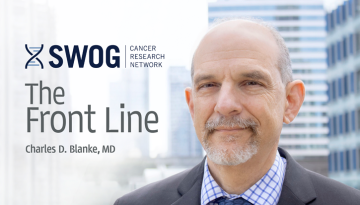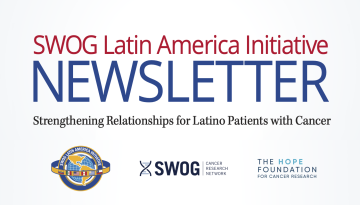Adjuvant Benefit in Highest Risk Clear-Cell RCC
A secondary analysis from the SWOG S0931 EVEREST trial has found that in the subgroup of patients with clear-cell renal cell carcinoma (RCC) who were at very-high risk of recurrence, those who were treated with everolimus after surgery had a statistically significant improvement in recurrence-free survival compared to patients getting placebo after surgery.
The results will be presented at the European Society of Medical Oncology (ESMO) Congress 2023 in Madrid, Spain, on Oct. 23, 2023 (poster 1887P) by Primo N. Lara, Jr., MD, lead author on the abstract. Lara is distinguished professor of medicine and executive associate dean for cancer programs at the University of California Davis School of Medicine, director of the UC Davis Comprehensive Cancer Center, and group co-chair-elect of the SWOG Cancer Research Network, a cancer clinical trials group funded by the National Cancer Institute (NCI).
SWOG S0931 is the only phase 3 trial of an mTOR inhibitor given as adjuvant therapy (therapy after surgery) to patients with RCC. The study enrolled more than 1,500 patients with either clear-cell or non-clear-cell RCC who were considered at intermediate risk or very high risk of having their disease recur. Eligible patients were randomized to one year of either everolimus or placebo, both after surgery.
The trial’s primary results, published earlier this year in The Lancet by a team led by S0931 principal investigator Christopher W. Ryan, MD, of Oregon Health and Science University Knight Cancer Institute, found that although recurrence-free survival time was longer for patients on the everolimus arm, the difference narrowly missed meeting the criterion for statistical significance.
The abstract Lara presents at ESMO reports results of a secondary analysis of a subset of these patients – those whose RCC was of clear-cell histology and who were considered to be in the category of very high-risk for disease recurrence.
Among the 699 eligible patients in this subgroup, those on the everolimus arm had a 20 percent lower risk of disease recurrence or death than those on the placebo arm (hazard ratio: 0.80; 95 percent confidence interval: 0.65-0.99; two-sided P value = 0.040).
Importantly, the characteristics of patients in this subgroup – patients with RCC with a clear-cell component whose disease was completely resected and who were considered at very high risk for recurrence – closely resemble those of the patients enrolled to the only two previous clinical trials of adjuvant therapy in RCC that reported positive results. These trials were the S-TRAC and KN546 studies, each of which led to Food and Drug Administration approval of a drug.
“The focus on patients with clear cell RCC at very high risk for recurrence allows researchers to better interpret the results of EVEREST in the context of the modestly positive S-TRAC and KN546 trials,” Lara said.
Among the S0931 patients in the current analysis, Grade 3 or higher adverse events (side effects) were more frequent on the everolimus arm than on the placebo arm (42 percent of patients versus 8 percent). Those on the everolimus arm were also more likely to discontinue treatment. Only 47 percent of patients on this arm completed all treatment as planned, compared to 64 percent of patients on the placebo arm.
Study S0931 is supported by the NCI, part of the National Institutes of Health (NIH), led by SWOG, and conducted by the NIH-funded NCI National Clinical Trials Network (NCTN).
S0931 is funded by the NIH/NCI through grants U10CA180888, U10CA180819, U10CA180820, and U10CA180821 and is supported in part by Novartis Pharmaceuticals Corporation.
In addition to Lara, coauthors on the ESMO abstract include Catherine M. Tangen, of SWOG Statistics and Data Management Center; Elisabeth I. Heath, of Wayne State University/Karmanos Cancer Institute; Mark N. Stein, of Columbia University/Herbert Irving Cancer Center; Maxwell Meng, of University of California San Francisco; Ajjai S. Alva, of University of Michigan Rogel Comprehensive Cancer Center; Sumanta K. Pal, of City of Hope Comprehensive Cancer Center; Igor Puzanov, of Roswell Park Comprehensive Cancer Center; Joseph I. Clark, of Loyola University Chicago Medical Center; Toni K. Choueiri, of Dana-Farber Cancer Institute; Neeraj Agarwal, of Huntsman Cancer Institute, University of Utah; Robert Uzzo, of Fox Chase Cancer Center, Temple Health; Naomi B. Haas, of Abramson Cancer Center, University of Pennsylvania; Melissa Plets, of SWOG Statistics and Data Management Center; Ulka N. Vaishampayan, of University of Michigan Rogel Comprehensive Cancer Center; Brian M. Shuch, of UCLA School of Medicine; Ian M. Thompson, of Children’s Hospital of San Antonio; and Christopher W. Ryan, of Oregon Health & Science University Knight Cancer Institute.
Reference:
“Adjuvant everolimus (EVE) in patients (pts) with completely resected very high-risk renal cell cancer (RCC) and clear cell histology: results from the phase III SWOG S0931 (EVEREST) trial.” Poster presentation 1887P, Monday, October 23, 2023.
Other Recent Stories



